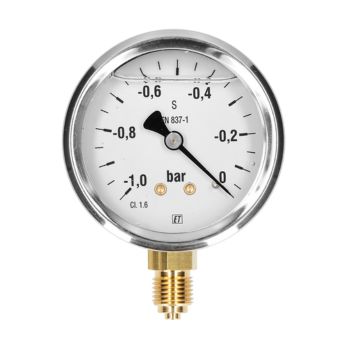
Nexaparts offers various pressure gauges in the range, ranging from 0 to 600 bar. This means that Techniparts has a pressure gauge available for every application. Determining which pressure gauge you need can be difficult, as it can vary depending on the application. There are differences in pressure units, safety and lifespan, materials, pressure measuring techniques, accuracy class, nominal housing size, and pressure ranges.
Techniparts also includes pressure gauges with glycerin in the range. Glycerin helps absorb pressure surges. As a result, the pressure gauge with glycerin is excellent for use in applications with high-pressure spikes or vibrations.
Accurate Pressure Measurements: Pressure gauges provide accurate measurements of pressure in a system, allowing you to monitor performance and efficiency. By being able to monitor pressure in real-time, you can quickly identify potential issues and take corrective measures before they lead to serious damage.
Safety: In many industries, maintaining pressure within safe limits is essential. Pressure gauges help monitor pressure levels and alert to abnormal pressure increases or decreases. This helps prevent accidents and ensures the safety of employees and equipment.
Quality Control: In manufacturing processes where pressure plays a crucial role, such as in the food and beverage industry, it's important to control pressure accurately. Pressure gauges enable you to maintain the correct pressure settings, resulting in consistent product quality.
Mechanical Pressure Gauges: These traditional pressure gauges use a spring mechanism to measure pressure. They are reliable, durable, and can measure a wide range of pressure values. Mechanical pressure gauges come in various accuracy levels and can be customized for specific applications.
Digital Pressure Gauges: Digital pressure gauges use electronic sensors to measure and display pressure on a digital screen. They offer high accuracy, easy reading, and additional features such as data storage and peak value capture. Digital pressure gauges are ideal for situations where precision and ease of use are important.
Choose the right pressure gauge for your application: Consider pressure ranges, accuracy requirements, and environmental factors when selecting a pressure gauge. Ensure that the chosen pressure gauge is suitable for the specific pressure conditions in which it will be used.
Calibrate regularly: To ensure that your pressure gauge provides accurate measurements, it's important to calibrate it regularly. Follow the manufacturer's instructions and use a calibrated reference source to check accuracy and make adjustments if necessary.
Protect the pressure gauge: Pressure gauges are sensitive instruments and should be protected from impacts, vibrations, and extreme temperatures. Use protective cases and ensure proper installation to prevent damage.
Pressure gauges play a crucial role in measuring and controlling pressure in various applications. By providing accurate pressure measurements, they contribute to safety, quality control, and performance optimization. Choose the right pressure gauge for your specific needs, calibrate it regularly, and protect it from damage. With pressure gauges, you can keep pressure under control and obtain reliable measurements for efficient operation of your systems.
Didn't find the right Manometer?
Fill in the form below, and we'll assist you further!
Curious about our blog? Check out all our items here!
Contact us here